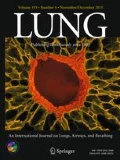Abstract
Background
Asthma is characterized by airflow limitation with chronic airway inflammation, hyperresponsiveness and mucus hypersecretion. NO is generated by three nitric oxide synthase (i/n/eNOSs) isoforms, but conflicting results have been reported using asthmatic mice treated with NOSs inhibitors and NOS-knockout mice. To elucidate the authentic role of NO/NOSs in asthma, we used asthmatic mice lacking all NOSs (n/i/eNOS−/−).
Methods
Wild-type and n/i/eNOS−/− mice were sensitized and challenged with ovalbumin. Pathological findings and expressions of interferon (IFN)-γ, interleukin (IL)-4, -5, -10, -13 and chemokines in the lung were evaluated.
Results
Decreased eosinophilic inflammation, bronchial thickening and mucus secretion, IL-4, -5 and -13, monocyte chemoattractant protein-1, eotaxin-1 and thymus and activation-regulated chemokine expressions were observed in n/i/eNOS−/− mice compared to wild-type, but expressions of IFN-γ and IL-10 were similar.
Conclusion
Using asthmatic n/i/eNOS−/− mice, NO plays important roles in accelerating bronchial eosinophilic inflammation and mucus hypersecretion in the pathophysiology of asthma.


References
Kharitonov SA, Yates D, Robbins RA et al (1994) Increased nitric oxide in exhaled air of asthmatic patients. Lancet 343:133–135
Ricciardolo FL, Di Stefano A, Sabatini F, Folkerts G (2006) Reactive nitrogen species in the respiratory tract. Eur J Pharmacol 533:240–252
Hamid Q, Springall DR, Riveros-Moreno V et al (1993) Induction of nitric oxide synthase in asthma. Lancet 342:1510–1513
De Sanctis GT, Mehta S, Kobzik L et al (1997) Contribution of type I NOS to expired gas NO and bronchial responsiveness in mice. Am J Physiol 273:L883–L888
Holla LI, Buckova D, Kuhrova V et al (2002) Prevalence of endothelial nitric oxide synthase gene polymorphisms in patients with atopic asthma. Clin Exp Allergy 32:1193–1198
Feder LS, Stelts D, Chapman RW et al (1997) Role of nitric oxide on eosinophilic lung inflammation in allergic mice. Am J Respir Cell Mol Biol 17:436–442
Blease K, Kunkel SL, Hogaboam CM (2000) Acute inhibition of nitric oxide exacerbates airway hyperresponsiveness, eosinophilia and C–C chemokine generation in a murine model of fungal asthma. Inflamm Res 49:297–304
Trifilieff A, Fujitani Y, Mentz F et al (2000) Inducible nitric oxide synthase inhibitors suppress airway inflammation in mice through down-regulation of chemokine expression. J Immunol 165:1526–1533
Rodriguez D, Keller AC, Faquim-Mauro EL et al (2003) Bacterial lipopolysaccharide signaling through toll-like receptor 4 suppresses asthma-like responses via nitric oxide synthase 2 activity. J Immunol 171:1001–1008
De Sanctis GT, MacLean JA, Hamada K et al (1999) Contribution of nitric oxide synthases 1, 2, and 3 to airway hyperresponsiveness and inflammation in a murine model of asthma. J Exp Med 189:1621–1630
Xiong Y, Karupiah G, Hogan SP et al (1999) Inhibition of allergic airway inflammation in mice lacking nitric oxide synthase 2. J Immunol 162:445–452
Ten Broeke R, De Crom R, Van Haperen R et al (2006) Overexpression of endothelial nitric oxide synthase suppresses features of allergic asthma in mice. Respir Res 7:58
Tsutsui M, Shimokawa H, Morishita T et al (2006) Development of genetically engineered mice lacking all three nitric oxide synthases. J Pharmacol Sci 102:147–154
Morishita T, Tsutsui M, Shimokawa H et al (2005) Nephrogenic diabetes insipidus in mice lacking all nitric oxide synthase isoforms. Proc Natl Acad Sci USA 102:10616–10621
Inoue H, Kato R, Fukuyama S et al (2005) Spred-1 negatively regulates allergen-induced airway eosinophilia and hyperresponsiveness. J Exp Med 201:73–82
Cuhna FQ, Moncada S, Liew FY (1992) Interleukin-10 (IL-10) inhibits the induction of nitric oxide synthase by interferon gamma in murine macrophages. Biochem Biophys Res Commun 182:1155–1159
Borish L, Aarons A, Rumbyrt J et al (1996) Interleukin-10 regulation in normal subjects and patients with asthma. J Allergy Clin Immunol 97:1288–1296
Ameredes BT, Zamora R, Sethi JM et al (2005) Alterations in nitric oxide and cytokine production with airway inflammation in the absence of IL-10. J Immunol 175:1206–1213
Noguchi S, Yatera K, Wang KY et al (2014) Nitric oxide exerts protective effects against bleomycin-induced pulmonary fibrosis in mice. Respir Res 15:92
Singh D, Richards D, Knowles RG et al (2007) Selective inducible nitric oxide synthase inhibition has no effect on allergen challenge in asthma. Am J Respir Crit Care Med 176:988–993
Acknowledgments
We thank Ms. Yoshiko Yamazaki, Michiyo Taguchi, Kumiko Matsuyama for their technical support. This study was partially supported by a Ministry of Education, Science, Sports and Culture Grant-in-Aid for Scientific Research (C), 24591183, 2012.
Author information
Authors and Affiliations
Corresponding author
Ethics declarations
Conflict of interest
The authors declare that they have no conflicts of interest.
Rights and permissions
About this article
Cite this article
Akata, K., Yatera, K., Wang, KY. et al. Decreased Bronchial Eosinophilic Inflammation and Mucus Hypersecretion in Asthmatic Mice Lacking All Nitric Oxide Synthase Isoforms. Lung 194, 121–124 (2016). https://doi.org/10.1007/s00408-015-9833-4
Received:
Accepted:
Published:
Issue Date:
DOI: https://doi.org/10.1007/s00408-015-9833-4

